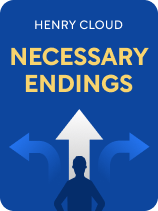

This article is an excerpt from the Shortform book guide to "Necessary Endings" by Henry Cloud. Shortform has the world's best summaries and analyses of books you should be reading.
Like this article? Sign up for a free trial here.
What is Necessary Endings by Henry Cloud about? Are you ready to put the past behind you?
If you’ve ever struggled to leave a lousy job or a toxic relationship, psychologist Henry Cloud has advice for you. In Necessary Endings, Henry Cloud argues that pulling out of a bad situation is often the best way to move forward with your life.
Read below for a brief overview of Necessary Endings.
Necessary Endings by Henry Cloud
In Necessary Endings, Henry Cloud teaches you how to break free from the relationships and situations that are holding you back. Cloud asserts that many people suffer needlessly in both business and their personal lives because of their inability to exit these types of situations. He argues that by learning to end things, you’ll empower yourself to succeed.
Cloud is a clinical psychologist and best-selling author who has written multiple books designed to empower readers to take control of their lives. Published in 2010, Necessary Endings aims to help audiences who are struggling to break free from unproductive patterns in both their professional and personal lives.
Learn to Accept Endings
According to Cloud, endings are an inevitable and often beneficial part of life—a crucial part of growth and change. For new, healthy patterns to begin, old, unproductive patterns must end. However, Cloud notes that people often avoid breaking things off because it can be difficult and uncomfortable. In some cases, you might avoid ending a relationship because you’re afraid to hurt the other person, or you may be uncertain about your decision. In other cases, you may not have the needed skills to make the ending happen.
Regardless of the reason for your discomfort, the first step in ending something is getting comfortable with endings in general. To get comfortable with endings, Cloud recommends recognizing that endings are natural, remaining open to unexpected outcomes, and learning to diagnose unrealistic ambitions.
Endings Are a Natural Part of Life
According to Cloud, endings are a natural part of life. He notes that in nature, cycles that include both endings and new beginnings are the norm—often, the end of a particular season or stage of life is what makes the new beginning possible. He suggests that keeping in mind the role of endings in nature may make it easier for you to accept their role in your life.
For example, consider wildfires. Most often triggered by lightning, wildfires are a natural ending. They’re capable of bringing an end to much of the plant and animal life of large areas. At first glance, wildfires might seem to be wholly destructive. However, areas razed by these fires tend to be especially fertile and hospitable for rare species of plants and animals. In fact, there are some seeds that only germinate in the wake of wildfires—new life that wouldn’t have been possible without an ending coming first.
Remain Open to Unexpected Outcomes
As you get comfortable with the role of endings in nature, stay open to unexpected outcomes. According to Cloud, when we enter a business venture or relationship, we often have a single goal in mind—the success of our original vision for a product, or marriage and 2.4 kids with a new partner. When you focus too intently on a desired outcome, it can make it harder for you to adapt to any other outcome. Instead, Cloud suggests altering your expectations—continue hoping for success, but remain alert to the possibility that new products and relationships may go in unexpected directions.
For instance, suppose you’re the entrepreneur behind a new subscription service. Your service combines two elements: You ship accessories like jewelry and cufflinks, and fancy snacks to go along with them, including caviar and imported cheeses. You receive constant feedback from prospective customers, who complain that a jewelry subscription is too expensive, and that they’d prefer an option to subscribe to just the snack box. If you’re too set on your original vision, you might not be able to make the change. However, if you remain open to other outcomes, you’ll be able to pivot, end your jewelry sales, and make a windfall selling standalone fancy snack subscriptions.
Unrealistic Goals Prevent You From Accepting Endings
Along with staying open to unexpected outcomes, consider the role that unrealistic goals play in your thoughts about endings. Unrealistic goals are dreams for a particular project or relationship that are unlikely to occur based on the evidence. Cloud argues that by setting your sights on unrealistic goals, you blind yourself to the reality of a situation, making it impossible to determine when it’s time for an ending.
To diagnose unrealistic goals, look at the situation from an objective perspective. If you were a stranger to your business or relationship, would you be able to find reasons to believe in its success? If not, you may have set goals that don’t reflect the reality of the situation.
Determine Where Endings Are Needed
Once you’ve gotten comfortable with endings, it’s time to determine where to implement endings in your life. Cloud offers suggestions for assessing both the difficult situations and relationships in your life.
Assess Difficult Situations
When assessing difficult situations in your life, look out for three types of negative situations: situations that are good but not great, mediocre situations that are unlikely to improve, and lost causes.
Assess Difficult Relationships
As opposed to more generalized situations, Cloud offers a separate set of strategies for assessing relationships that may need to end. He recommends that you consider the structural factors around the relationship, use character as a basis for assessment, and put the ball in the other person’s court.
Enact Endings
Once you’ve determined that a change or an ending is needed in a particular situation, create structures that encourage you to act. Then, when it’s time to break things off, prepare carefully for that conversation. Finally, after an ending, take time to grieve, as grieving helps you process the experience and learn from it.
Create Structures That Encourage Action
As you move toward ending a situation or relationship, you’ll want to create structures that keep you engaged in the process. Cloud notes that it’s easy to lose focus when dealing with difficult situations. Because these situations are painful, we naturally want to focus elsewhere, which can lead us to delay making important changes.
To stay focused on the problem situation, regularly schedule time to work on the problem, and set deadlines for taking action. Regularly scheduling time to work on the problem helps you avoid losing focus, and setting deadlines helps ensure that you don’t delay your endings indefinitely.
It can be helpful to bring other people in to hold you accountable to your decisions. Cloud argues that people who aren’t directly involved are less likely to avoid the problem and can help to keep you motivated.
For example, if you need help ending a dead-end job, you could set a deadline with someone who will keep you accountable, such as a friend, coworker, or family member. While on your own it might be easy to delay putting in your two weeks’ notice, having a friend to call you out can help redirect your focus.
Prepare for the Ending Conversation
When it comes time to end a relationship, thoroughly prepare for the ending conversation. Cloud contends that people often go into these conversations underprepared, which leads them to make mistakes that make the process more difficult and confusing for everyone involved.
The first step in preparing for an ending conversation is to set goals for what you’d like to accomplish during the conversation. According to Cloud, people who enter these kinds of conversations without clear goals in mind often end up waffling or letting the other person convince them to change their mind. For example, if you decide to fire an employee whose role has become obsolete, your goal might be to clearly communicate that the employee is fired, while also thanking them for their time at the company and letting them know that you’re open to being listed as a reference. With these goals in mind, it’ll be easier to stay on task in the heat of the moment.
Once you’ve set goals for the conversation, it can help to rehearse. Endings can be emotional, and you may find it difficult to remember everything you wanted to say when the time comes. While it might sound silly, writing a script and practicing it can help you feel more confident later on.
When writing your script, be sure to focus on the problem in the relationship, not the person. According to Cloud, focusing on the other person’s flaws can make them feel attacked, which may result in a heated and uncomfortable conversation. By focusing on the relationship’s issues, you’ll maintain clarity without upsetting the other person as much.
During the conversation, try to balance empathy with firmness. Cloud says people are more receptive to ending conversations when you approach them gently. However, at the same time, take care not to be too gentle, as this might give the other person the impression that you aren’t serious. Don’t be cold, but don’t leave any wiggle room either.
Take Time to Process and Reflect
After ending a situation or relationship, take time to process your feelings and reflect on the situation and its ending. Cloud argues that taking time to process your emotions after an ending is an essential part of the process. Processing and reflecting on the situation can help you to learn from it. As you reflect, make an effort to understand what went wrong. Doing so will help you avoid similar situations in the future.
By contrast, when you avoid reflecting on your feelings, you’re liable to make the same mistakes again. Not only this, but when you avoid processing your feelings and instead choose to avoid them, you’re also more likely to make impulsive decisions to distract you from your pain.

———End of Preview———
Like what you just read? Read the rest of the world's best book summary and analysis of Henry Cloud's "Necessary Endings" at Shortform.
Here's what you'll find in our full Necessary Endings summary:
- That pulling out of a bad situation is the best way to move forward in life
- How to assess which situations and relationships need to end
- How to make sure that your endings stick






